Eight graduate students at universities in Florida have received Guy Harvey scholarship awards, recognizing their outstanding achievement in marine fisheries science research. The following winners received $5,000 scholarships:
- Breanna DeGroot, Florida Atlantic University
- Rachel Skubel, University of Miami
- Amanda Macek, Jacksonville University
- Jennifer Loch, University of Central Florida
- Susana Hervas Avila, University of Florida
- Alyssa Andres, University of South Florida
- Grant Scholten, University of Florida
- Barry Walton, Florida State University
The scholarship, established in 2010 through a partnership between Florida Sea Grant and the Guy Harvey Ocean Foundation, recognizes students at Florida universities whose research focuses on the biology, ecology, habitat or management of fisheries in Florida’s marine environment. Since the award was established, $224,000 in scholarships has now been awarded to 47 students at nine different Florida universities.
Recipients also receive a certificate designed and signed by well-known marine wildlife artist and conservationist Guy Harvey. Thus far, awards have been given to students at the University of Florida, Florida State University, University of Central Florida, University of South Florida, University of Miami, Jacksonville University, University of North Florida, Florida Atlantic University, Florida International University and the Florida Institute of Technology.
“The recipients of the scholarship are the best and brightest of Florida’s college students who are conducting research dealing with marine fish or fisheries management issues,” said Karl Havens, director of Florida Sea Grant.
Greg Jacoski, director of the Guy Harvey Ocean Foundation, agreed. “We are delighted that this scholarship program is having such an impact, both in regard to supporting Florida college students and in supporting important research projects,” he said. “The partnership with Florida Sea Grant has been good for us, and good for aspiring marine science students and our oceans.”
This year’s research projects range from investigating the red snapper fishery conflict in the Gulf of Mexico to evaluating how sharks respond to climate change.
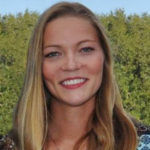
Breanna DeGroot
Breanna DeGroot is a master’s student in biological science at Florida Atlantic University’s Harbor Branch Oceanographic Institute. She is studying the movement and habitat of spotted eagle rays throughout Florida.
“The goal of my project is to make more informed international management decisions and local conservation plans of this state-protected species,” DeGroot said. “I envision the rest of my career being dedicated to understanding the movement of ecologically and commercially important marine species and relaying my findings to the public in new and interactive ways.”
DeGroot worked for two years as a research assistant and education specialist at Mote Marine Laboratory. Prior to that she maintained materials for biology and chemistry labs at the University of South Florida and served as an educator for the Sarasota Bay Explorers. She said she knew she wanted to be a marine biologist after a family vacation to Stingray City on Grand Cayman Island when she was 12.
“Although I was completely entranced by the grace with which these animals moved through the water, I couldn’t help but wonder what our presence was doing to their natural behaviors,” she said. “From this moment on I had direction in my career aspirations. I wanted to become a marine biologist. My ultimate career goal is to bridge the gap between scientific research and public knowledge. “
Matthew Ajemian, an assistant professor at FAU’s Harbor Branch Oceanographic Institute, said DeGroot’s research is providing key data for the conservation of spotted eagle rays in the Indian River Lagoon.
“Although just a year into her program, Breanna has already made tremendous strides in understanding this protected fish species,” Ajemian said. “Intensive fisheries for spotted eagle rays exist in nearby Mexican and Cuban waters and thus the impacts on local populations are possible yet unknown without knowledge of migratory connections.”

Rachel Skubel
Rachel Skubel is Ph.D. student in environmental science and policy at the University of Miami. For her dissertation, she is studying the impacts of climate change on sharks and coastal communities. To do so, she is combining research methods from the natural and social sciences.
“I am using physiological indicators of fishery capture stress and measurements of activity from satellite tagging to monitor how sharks respond to climate stressors like temperature and oxygen change,” Skubel explained. “I am also working with managers and scientists to integrate these responses into risk assessment frameworks and policy for monitoring the South Florida shark fishing community.”
Skubel said her Ph.D. research has helped her better understand the importance of interdisciplinary research and teams in addressing complex environmental issues.
“Following my doctorate, I would like to bring this same approach to tackling issues in fisheries, climate change, and associated human communities,” she said.
While earning her master’s degree in environmental science at McMaster University in Canada, Skubel founded an initiative, the iClimate Video Competition, to publicize and raise awareness of the climate change research going on at her university.
Neil Hammerschlag, a research assistant professor at the UM Rosenstiel School and Marine and Atmospheric Science, said Skubel’s research will be helpful for those managing the shark fishery.
“This research is important given a need to evaluate linkages among temperature, activity and stress associated with fisheries capture,” Hammerschlag said. “The importance of studying stress from fishery interactions is highly relevant to management planning.”
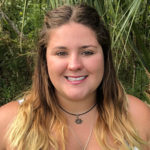
Amanda Macek
Amanda Macek is a master’s student in marine science at Jacksonville University. She is investigating how small anatomical changes in various commercially available circle hooks affect where sharks are hooked, the injuries they sustain, hook removal and related mortality.
“Circle hooks have become popularized by commercial and recreational fisheries as they reduce bycatch, injury, deep hooking, and mortalities. However, there is a lack of definition or regulations on circle hooks, which have saturated the market with a variety of shapes, sizes, and styles,” Macek said. “Ultimately, I would like to initiate change both commercially and recreationally by educating policy makers, the public and stakeholders about better gear choices that can have a positive impact on shark management.”
Macek also works as a biological scientist with the Florida Fish and Wildlife Conservation Commission’s Fisheries Independent Monitoring Program. Prior to that, she was a biological science technician with the U.S. Fish and Wildlife Service.
Although Macek became scuba certified at age 12, it wasn’t until her senior year of high school that she decided to pursue marine science.
“While diving in the Florida Keys I encountered a large nurse shark that swam next to me within arm’s reach,” Macek said. “As cliché as it sounds I had an ‘ah-ha’ moment.”
Curt Karboski, a fish biologist and Macek’s former supervisor at the U.S. Fish and Wildlife Service, said her “curiosity seems endless and drives her to ask pointed questions allowing her to continuously learn and grow. I am confident that her research into capture mortality of sharks will be of the highest quality,” he said.
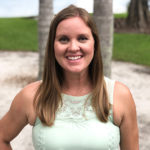
Jennifer Loch
Jennifer Loch is pursuing a Ph.D. in conservation biology at the University of Central Florida. She is assessing how sportfish like snapper, seatrout and snook respond to habitat restoration in the Indian River Lagoon. She hopes to shed light on how restoration can improve fisheries.
“Specifically, I am examining how sportfish populations and their food web connections differ before and after oyster reef and living shoreline restoration, compared to healthy and degraded habitats,” Loch said. “I use stomach content and stable isotope analyses to determine if their food web connections change with restoration and how it changes over time.”
Loch has served as an adjunct professor of biology at Valencia College and Seminole State College. She also worked as an environmental lands specialist with Osceola County Natural Resources.
“After completing my Ph.D., I plan to conduct research related to fisheries ecology and help identify ways to improve our marine fish populations,” Loch said.
Geoffrey Cook, an assistant professor in UCF’s Department of Biology and Loch’s adviser, said her research is original and timely. “Her proposed research uses cutting-edge methods to address fundamental knowledge gaps in fisheries ecology, and addresses key unresolved questions in the applied fields of restoration ecology and more broadly, conservation biology.”

Susana Hervas Avila
Susana Hervas Avila is a Ph.D. student in the fisheries and aquatic sciences program within the University of Florida’s School of Forest Resources and Conservation. Her dissertation is focused on understanding the various stakeholder perspectives of the red snapper fishery conflict in the Gulf of Mexico.
“The Gulf of Mexico red snapper fishery is highly controversial. It is used by commercial, for-hire and private recreational fishermen and it has been experiencing conflict for years,” Hervas Avila explained. “All these different users have different interests and views about the allocation, the science behind the decisions, and the decision-making process itself. So, by understanding the perceptions of the different stakeholders about the management of the fishery, we can gain insight into how to better manage this conflict.”
Kai Lorenzen, Florida Sea Grant’s fisheries specialist and Hervas Avila’s adviser, said he commends her for choosing to research “the most conflicted and controversial fishery in the United States.”
“Results from her study will help management agencies, stakeholder representatives and extension programs enhance the abilities of stakeholders to engage effectively and constructively in the management process, improve outcomes and reduce conflicts,” Lorenzen said.
Hervas Avila has previously worked as a communications and outreach manager for an environmental charity called Action for Community and Environment and as a researcher for The WorldFish Organization where she helped develop guidelines for farmers on aquaculture techniques.
She said her ultimate career goal is to improve the environment and well-being of the people who depend on it.
“I feel most inspired when I consider my work to be meaningful,” Hevas Avilas said. “My vision is to work toward bridging communication in conflict situations, which can be through research and mediation, and by supporting groups and individuals to effectively communicate.”
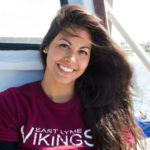
Alyssa Andres
Alyssa Andres is a Ph.D. student in marine science at the University of South Florida. She is investigating how sharks respond to climate change and some of the ecological consequences of those responses.
“I am investigating how anthropogenically driven decreasing oxygen levels and rising ocean temperatures influence how blacktips and bull sharks use energy,” Andres explained. “By determining species-specific tolerances to these environmental factors, I can identify marine habitats that have become unsuitable for these species in the Gulf of Mexico, and more accurately forecast shark responses, and potential distribution shifts in the face of climate change.”
Andres has worked as a staff biologist for the Behavioral and Physiology Program at Mote Marine Laboratory and as a research assistant for the Buck Island Reef National Monument Sea Turtle Research Program. She has also conducted shark research in western Australia and South Africa. It was during her first day as an intern with the Oceans Research Institute in South Africa that she knew she wanted to pursue shark research.
“I remember standing behind the railing on the gunnel of the boat holding on, and peering over the side, and I saw my first two white sharks pass under us, one right after the other,” Andres said. “I got chills up my spine and I was left so in awe of the power and grace these animals exhibited.”
Brad Seibel, professor of biological oceanography at USF, said although sharks are clearly a passion for Andres, “she also articulates very clearly that sharks are an important model to answer physiological and ecological questions.”
Andres hopes to remain in academia once she graduates.
“Ultimately, I would like to manage my own behavioral ecology and physiology lab and mentor future academics,” she said. “I want to advance the knowledge of environmental physiology, and broaden our understanding of how it, and advancing technologies can be used to inform marine policies.”
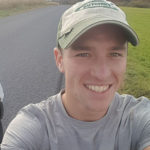
Grant Scholten
Grant Scholten is a Ph.D. student in the fisheries and aquatic sciences program within the University of Florida’s School of Forest Resources and Conservation. He is evaluating how sportfish populations, both freshwater and marine, might be affected by increased fishing pressure.
“As the interest in Florida’s amazing recreational fisheries grows, we want to ensure that they are sustainable so they can be enjoyed for generations that follow,” Scholten said.
Rob Ahrens, an associate professor of quantitative fisheries and stock enhancement at UF, said Scholten’s research has been successful because of his “strong rapport with anglers and charter captains.”
“He possesses communication skills needed to lead the conversation in a constructive direction regardless of the person,” Ahrens said. “His abilites to connect with stakeholders and mentor students are excellent.”
Scholten currently works as a graduate research assistant at the UF/IFAS Nature Coast Biological Station where he is investigating fishing mortality associated with catch-and-release fishing. In addition, he also conducts research on the conservation of native fishes in the Great Lakes Basin with the Great Lakes Science Center.
“Upon graduation, I will begin conducting research solely for the Great Lakes Science Center as a conservation biologist,” Scholten said.
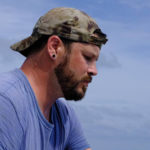
Barry Walton
Barry Walton is a master’s student in biological oceanography at Florida State University. He is studying the reproductive biology and behaviors of two marine catfish species, Ariopsis felis and Bagre marinus, which are both abundant throughout the southeastern U.S.
“I will study their fecundity, identify and describe sexual dimorphic traits, and perform genetic analysis to better understand their mating strategies,” Walton said. “In addition, I will be using ultrasonic acoustic telemetry to study their seasonal movement patterns, migration behaviors, and distribution throughout Apalachicola Bay.”
Walton became interested in marine and coastal science after an underwater encounter with a monk seal in Hawaii, where he trained explosive detection dogs as a Marine .
“After seeing a monk seal underwater I knew once my time as a Marine was over, I would pursue a career that would facilitate more experiences such as that one and enable me to protect these creatures for future generations to enjoy and admire,” said Walton, who served two stints in Iraq in 2005 and 2006 before medically retiring due to combat injuries.
Chip Cotton, a fisheries ecologist at FSU and Walton’s adviser, said, “Walton has consistently shown ambition and motivation in pursuit of his ultimate goal—an academic career in which he will promote fisheries conservation and train the next generation of marine conservation students.”
The Guy Harvey Ocean Foundation is an organization of philanthropists, conservationists, scientists and educators that emphasizes sensible strategies for promoting ocean conservation and the development of the next generation of marine scientists. The foundation funds research and educational programs developed by universities, colleges, institutes and nonprofit organizations. Learn more about the Guy Harvey Scholarships winners on our Current Fellows page, or learn more about the scholarship itself.



